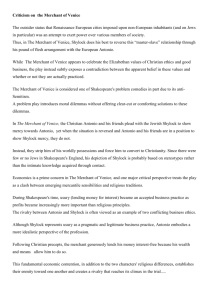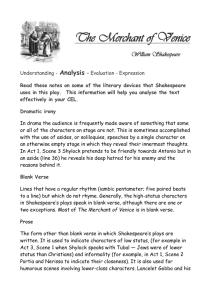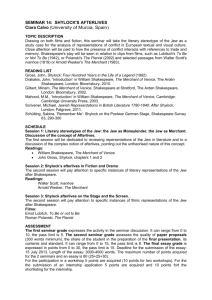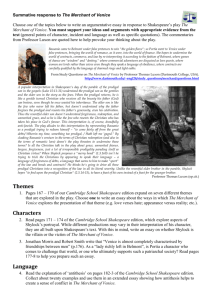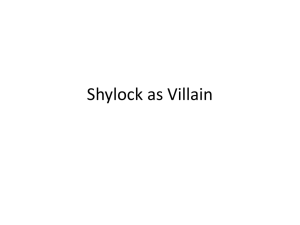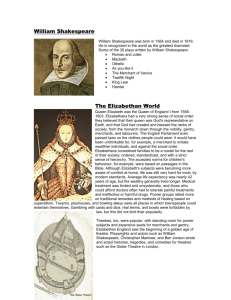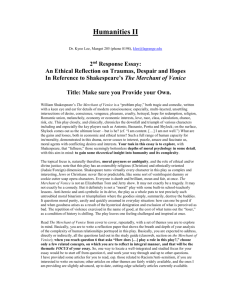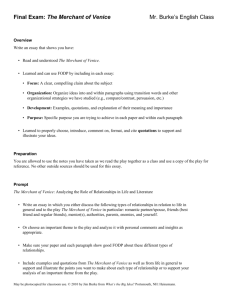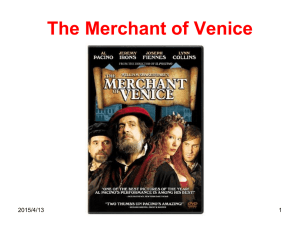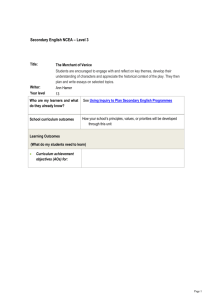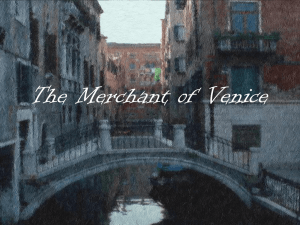Exemplar - Excellence with Annotations
advertisement
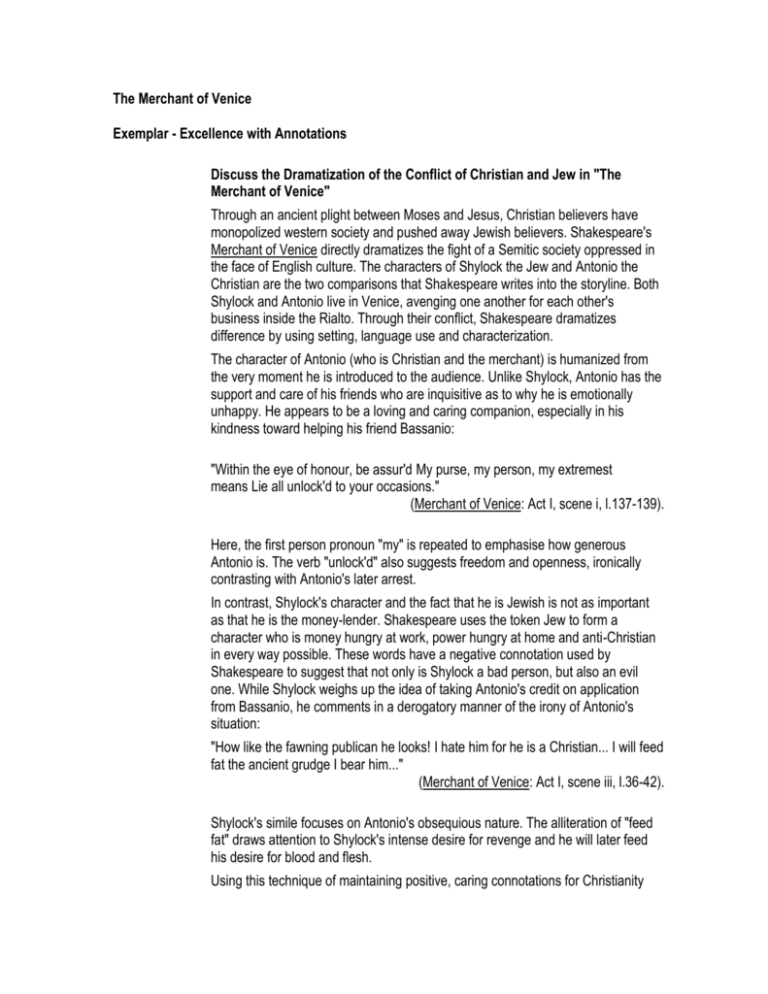
The Merchant of Venice Exemplar - Excellence with Annotations Discuss the Dramatization of the Conflict of Christian and Jew in "The Merchant of Venice" Through an ancient plight between Moses and Jesus, Christian believers have monopolized western society and pushed away Jewish believers. Shakespeare's Merchant of Venice directly dramatizes the fight of a Semitic society oppressed in the face of English culture. The characters of Shylock the Jew and Antonio the Christian are the two comparisons that Shakespeare writes into the storyline. Both Shylock and Antonio live in Venice, avenging one another for each other's business inside the Rialto. Through their conflict, Shakespeare dramatizes difference by using setting, language use and characterization. The character of Antonio (who is Christian and the merchant) is humanized from the very moment he is introduced to the audience. Unlike Shylock, Antonio has the support and care of his friends who are inquisitive as to why he is emotionally unhappy. He appears to be a loving and caring companion, especially in his kindness toward helping his friend Bassanio: "Within the eye of honour, be assur'd My purse, my person, my extremest means Lie all unlock'd to your occasions." (Merchant of Venice: Act I, scene i, l.137-139). Here, the first person pronoun "my" is repeated to emphasise how generous Antonio is. The verb "unlock'd" also suggests freedom and openness, ironically contrasting with Antonio's later arrest. In contrast, Shylock's character and the fact that he is Jewish is not as important as that he is the money-lender. Shakespeare uses the token Jew to form a character who is money hungry at work, power hungry at home and anti-Christian in every way possible. These words have a negative connotation used by Shakespeare to suggest that not only is Shylock a bad person, but also an evil one. While Shylock weighs up the idea of taking Antonio's credit on application from Bassanio, he comments in a derogatory manner of the irony of Antonio's situation: "How like the fawning publican he looks! I hate him for he is a Christian... I will feed fat the ancient grudge I bear him..." (Merchant of Venice: Act I, scene iii, l.36-42). Shylock's simile focuses on Antonio's obsequious nature. The alliteration of "feed fat" draws attention to Shylock's intense desire for revenge and he will later feed his desire for blood and flesh. Using this technique of maintaining positive, caring connotations for Christianity and negative, evil connotations for Semitism, Shakespeare guides the audience to a decision on the obvious: Christians are good, Jews are bad. At this point, however, it is notable to comment that in the time the play was written Shakespeare would have known no other Jews other than those called "conversios" who had converted to Christianity. This is due to Jews being effectively banned from England in 1290. This illustrated the attitude of the society that Shakespeare lived and grew up believing: a society of anti-Semitics. Without this decision between Christian and Jew being made, the overall plot would fail to portray the clash between the merchant and the money-lender. So it is central to the play that Shakespeare uses the Christian and Jew relationship in introducing the emotion of hate between the two religions for no other reason than to "stew the pot" and increase tension: "Call me misbeliever, cut-throat dog And spet upon my Jewish gabardine..." (Merchant of Venice: Act I, scene iii, l.106-107). With this volatile cocktail of emotion, Shakespeare uses this opportunity to add another complexity to the emotion of the play. The Jew's own daughter elopes to marry a Christian - worse in fact; the Christian is Antonio's Christian-friend. Consequently, Shylock becomes overwhelmed by his emotions and calls for Antonio's flesh in payment of the bond. This advances the author's strategy to which we may draw similarities to a game of chess. It provides a dramatic floor in which to elevate the argument between the merchant and the money-lender and bring it in to the court and the face the law: "The Duke cannot deny the course of the law: For the commodity that stranger have With us in Venice, if it be denied, Will much impeach the justice of the state..." (Merchant of Venice: Act III, scene iv, l.26-29). The setting of the court heightens the dramatic conflict of the characters. Venice was renowned as a place of rigorous justice. The opposing values of Antonio and Shylock can be explored in a formal setting, where mercy comes up against revenge. Throughout the play Shakespeare is able to manipulate the hate between Christian and Jew as a socio-religious flaw of the human mind. Creating intense threedimensional arguments, the author explores a fundamental element of the Elizabethan English psyche. He takes this opinion of the Jewish belief, and uses it to portray a spiteful tale of a Christian merchant and a Jewish money-lender within the context of a comedy. The play appears to be simply coincidental in its religious battles, but in heavy analysis, it is clear that Shakespeare uses this grounding in The Merchant of Venice as a strategy to reflect England and its extreme Christian ethnocentrism. This essay is generally sustained and insightful. Quotations are integrated and language is analysed. Vocabulary is developed and mature. There is a solid understanding of the historical context of the play. Overall grade: Excellence
